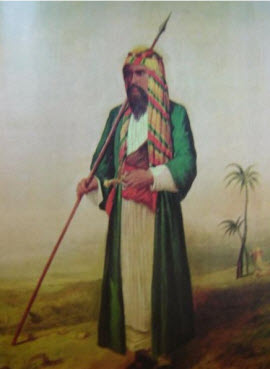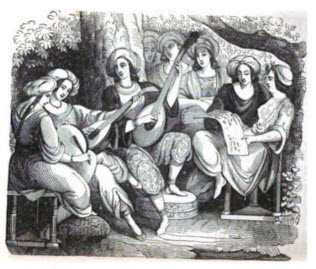Richard Burton, Translator of the Arabian Nights
Sir Richard Francis Burton was born at Barham House, Hertfordshire, England, March 19, 1821. He died at Trieste, Austria (now Italy), Oct. 20, 1890, Burton was a noted explorer and prolific writer of travels. One of his exploits was to make the pilgrimage to Mecca disguised as an Arab, for which he learned the language and customs well enough to deceive the locals.

Richard Burton in Arab Disguise
Burton was a larger than life adventurer, and intellectual, earning the nickname Ruffian Dick. He served in the Bombay Army in India and fought in the Crimean War, earning the rank of Captain. After his military service, Burton went in 1853 to Mecca. His "First Footsteps in Eastern Africa” (1856) were in 1854, when he accompanied Speke to Harrar. In 1858 he was again in East Africa with Speke, and discovered lake Tanganyika, while Speke discovered Lake Victoria. In 1861 he was in West Africa as British consul at Fernando Po; ascended the peak of Kamerun; and spent three months at the court of Dahomey. To the end of his life he continued in the consular service: at Santos, Brazil (1864); at Damascus (1868-72); at Triest, where he died (1872-90). Of the more than thirty volumes published by him, the principal are “Personal Narrative of a Pilgrimage to El Medina and Mecca ” (1855), “Lake Regions of Central Africa” (1860), “ A Mission to the King of Dahomey ” (1864), “Explorations of the Highlands of Brazil,” etc. (1868), “Gold Mines of Midian” (1878) and a literal version of the “Arabian Nights."
Burton's 16 volume version of the Arabian Nights entitled "The Book of the Thousand Nights and a Night" is famous for its explicit, unexpurgated language and depiction of sexual matters, which was highly unusual for Victorian England. As with all of his books, Burton's translation of the Arabian Nights was enhanced by copious footnotes.
His wife, Isabel Burton, was his greatest supporter and encouraged his literary endeavors. When he died, Isabel burned many of his papers and diaries, fearing that they would cause a scandal and lead to his damnation by tempting others to sin. We can only wonder what his writing contained.

